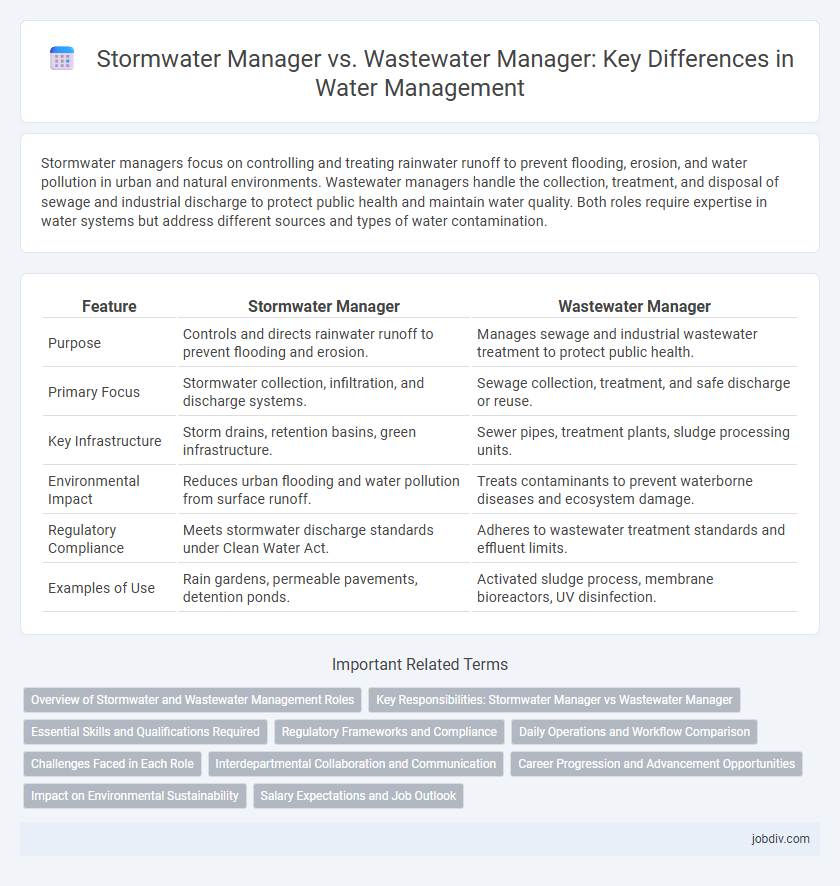Stormwater managers focus on controlling and treating rainwater runoff to prevent flooding, erosion, and water pollution in urban and natural environments. Wastewater managers handle the collection, treatment, and disposal of sewage and industrial discharge to protect public health and maintain water quality. Both roles require expertise in water systems but address different sources and types of water contamination.
Table of Comparison
| Feature | Stormwater Manager | Wastewater Manager |
|---|---|---|
| Purpose | Controls and directs rainwater runoff to prevent flooding and erosion. | Manages sewage and industrial wastewater treatment to protect public health. |
| Primary Focus | Stormwater collection, infiltration, and discharge systems. | Sewage collection, treatment, and safe discharge or reuse. |
| Key Infrastructure | Storm drains, retention basins, green infrastructure. | Sewer pipes, treatment plants, sludge processing units. |
| Environmental Impact | Reduces urban flooding and water pollution from surface runoff. | Treats contaminants to prevent waterborne diseases and ecosystem damage. |
| Regulatory Compliance | Meets stormwater discharge standards under Clean Water Act. | Adheres to wastewater treatment standards and effluent limits. |
| Examples of Use | Rain gardens, permeable pavements, detention ponds. | Activated sludge process, membrane bioreactors, UV disinfection. |
Overview of Stormwater and Wastewater Management Roles
Stormwater managers focus on controlling and directing surface runoff from rain or melting snow to prevent flooding and pollution, ensuring safe discharge into water bodies through infrastructure such as retention basins and permeable pavements. Wastewater managers handle the collection, treatment, and disposal of sewage and industrial effluents, maintaining water quality standards and protecting public health via treatment plants and sewer systems. Both roles are crucial in urban water cycle management, with stormwater addressing storm-related flows and wastewater focusing on sanitation and pollution control.
Key Responsibilities: Stormwater Manager vs Wastewater Manager
Stormwater Managers oversee the design and maintenance of systems that control surface runoff to prevent flooding and reduce pollutant loads entering natural water bodies. Wastewater Managers focus on the treatment and disposal of sewage and industrial effluents to ensure compliance with environmental regulations and protect public health. Both roles require expertise in regulatory compliance, infrastructure management, and environmental impact assessment but address distinct phases of the water cycle.
Essential Skills and Qualifications Required
Stormwater managers require expertise in hydrology, urban planning, and environmental regulations to design systems that control runoff and prevent flooding. Wastewater managers must possess knowledge of biological and chemical treatment processes, infrastructure maintenance, and compliance with water quality standards. Both roles demand strong problem-solving skills, project management experience, and proficiency with environmental monitoring technologies.
Regulatory Frameworks and Compliance
Stormwater managers navigate regulations such as the Clean Water Act's National Pollutant Discharge Elimination System (NPDES) permits, emphasizing surface runoff control to prevent pollutant discharge into natural water bodies. Wastewater managers comply with stricter effluent standards under the Clean Water Act, focusing on treating sewage and industrial waste before discharge or reuse. Both roles require adherence to local, state, and federal regulations, but stormwater management often involves non-point source pollution controls, while wastewater management deals primarily with point source pollution compliance.
Daily Operations and Workflow Comparison
Stormwater managers primarily focus on controlling surface runoff through drainage systems, retention basins, and pollution prevention measures to reduce flooding and protect water quality during rainfall events. Wastewater managers oversee the treatment and processing of sewage and industrial effluents using advanced treatment plants to meet regulatory discharge standards. Daily operations for stormwater involve monitoring drainage infrastructure and storm events, whereas wastewater management requires continuous treatment process control, sludge handling, and compliance reporting.
Challenges Faced in Each Role
Stormwater managers confront challenges related to controlling runoff quality, mitigating floods, and managing pollutants from urban surfaces to prevent ecosystem damage. Wastewater managers face difficulties in treating diverse contaminants, maintaining aging infrastructure, and meeting strict regulatory standards for discharge to protect public health. Both roles require advanced technology integration and adaptive strategies to address climate change impacts and increasing population pressures.
Interdepartmental Collaboration and Communication
Stormwater managers coordinate with wastewater managers to ensure integrated water quality control, emphasizing shared data on runoff patterns and pollution sources. Effective interdepartmental communication streamlines response to flooding events and infrastructure maintenance, reducing environmental risks. Collaboration enhances resource allocation, regulatory compliance, and holistic watershed management for improved urban resilience.
Career Progression and Advancement Opportunities
Stormwater managers often begin their careers in environmental science or civil engineering, focusing on managing rainwater runoff and mitigating flooding risks, with advancement opportunities leading to senior project management or specialized roles in urban water sustainability. Wastewater managers typically have a background in environmental engineering or chemistry, overseeing the treatment of sewage and industrial effluents, and can progress to leadership positions such as director of water treatment facilities or regulatory compliance manager. Both career paths offer opportunities for professional certification, interdisciplinary collaboration, and roles influencing public health and environmental policy.
Impact on Environmental Sustainability
Stormwater managers focus on controlling runoff to reduce pollutants entering natural water bodies, thereby protecting ecosystems and maintaining biodiversity. Wastewater managers treat sewage and industrial discharge to prevent water pollution and promote safe water reuse, significantly reducing environmental contamination. Effective collaboration between stormwater and wastewater management enhances overall environmental sustainability by minimizing harmful impacts on water quality and aquatic habitats.
Salary Expectations and Job Outlook
Stormwater Managers typically earn between $60,000 and $90,000 annually, with salaries influenced by municipal budgets and environmental project funding. Wastewater Managers command higher median salaries, ranging from $70,000 to $110,000, driven by the critical need for public health and regulatory compliance in water treatment. Job outlook for both roles shows steady growth, but Wastewater Managers face stronger demand due to increasing infrastructure investments and stricter water quality regulations.
Stormwater Manager vs Wastewater Manager Infographic

 jobdiv.com
jobdiv.com